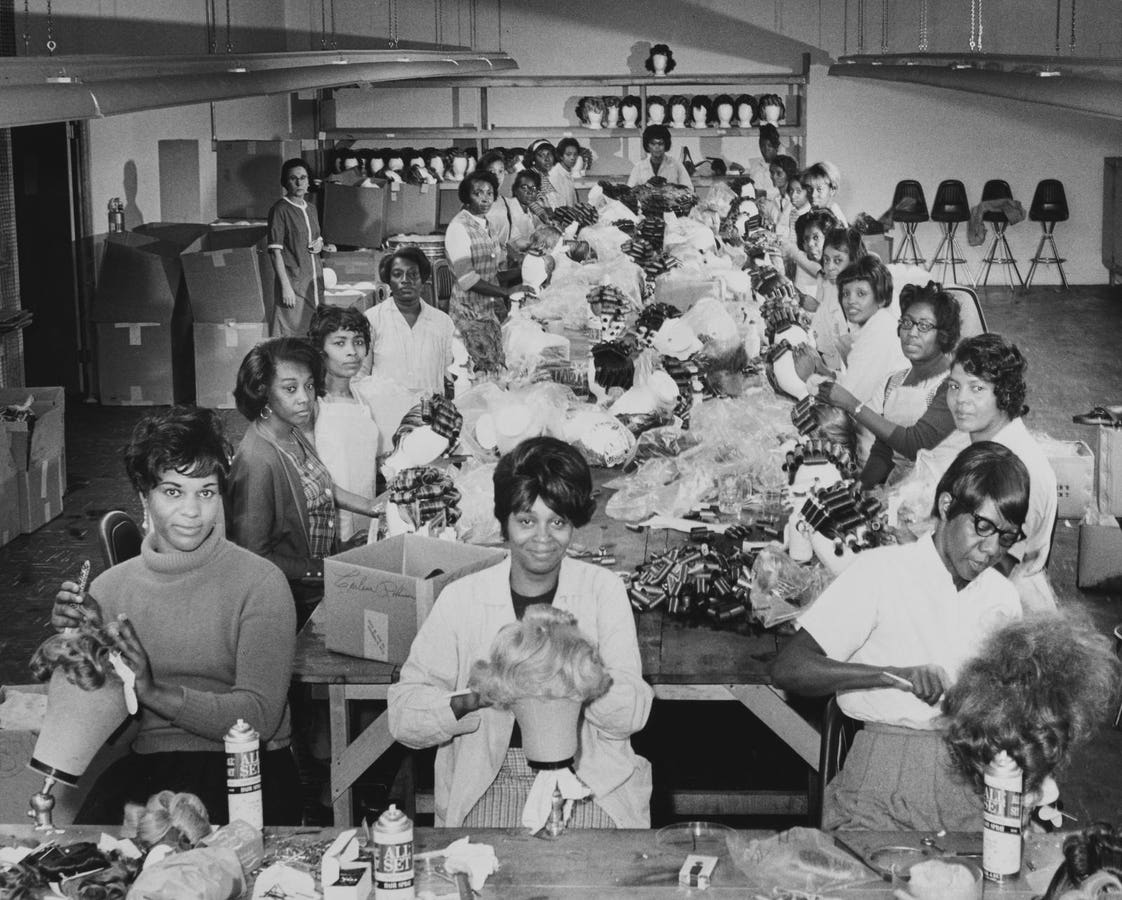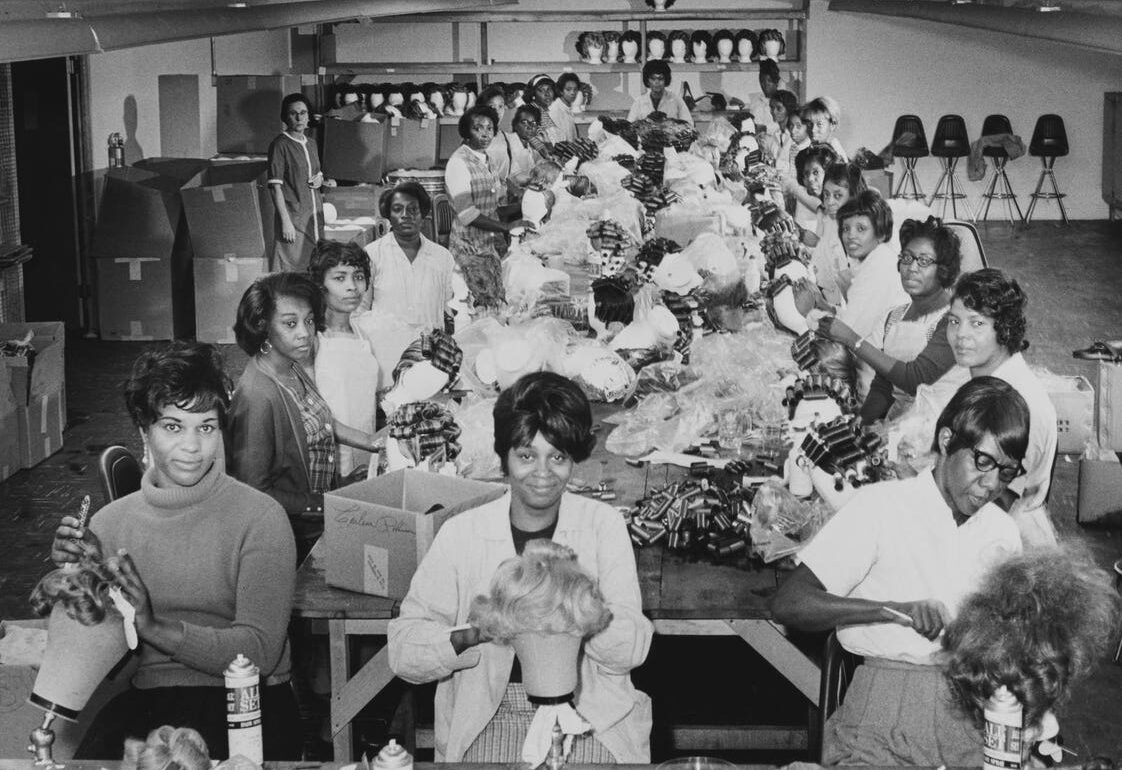
For many women, wigs have become more than just a fashion accessory. The adoption of wigs by Black women not only reflects their creative and individualistic spirit but also highlights the myriad advantages these hairpieces offer, enhancing both their physical and emotional well-being.
If we go back to slavery era, Black women were often forced to cover their natural hair due to Eurocentric beauty standards imposed by slaveholders. This led to the adoption of headwraps and other coverings. In more contemporary times, we’ve seen the practice of wearing wigs and weaves evolve into more personal choices, fashion and self-expression.
Embracing wigs not only offers Black women versatile and creative styling options but also serves as a protective style promoting hair health and providing a solution for those navigating hair loss. It embodies a holistic approach to beauty and well-being.
Expert hair stylists at UNice Hair, Camille Defritas and Kenna Edgehill, share their perspectives on the transformative power of innovative wig technologies and the crucial role they play in fostering confidence, self-esteem and representation.
Innovative Wig Technologies: A Revolution in Choices
In the dynamic landscape of the hair industry, the evolution of wigs and their impact on women experiencing hair loss stands out prominently.
Defritas notes the significant strides made in the last decade within the wig industry. Sharing companies like UNice have led the way with innovating breathable wig caps, thinner lace, pre-plucked hairlines and more realistic hair textures.
“These advancements are so beneficial for women and men experiencing hair loss, because there are more options that they have to choose from to make sure they find the perfect wig for them,” Defritas emphasizes.
Brooklyn, NY: Kenna Edgehill, UNice Stylist, showcases a personalized color and natural installation … [+]
Kenna Edgehill
According to John Hopkins Medicine, almost half of black women experience some form of hair loss. However, few doctors are familiar with black hairstyling practices.
Edgehill highlights the transformative nature of wig materials and technologies.
“The thought of having to wear a wig (not choosing to) is usually a tough time for most women suffering from conditions like alopecia or chemotherapy,” Edgehill explains.
According to Edgehill, wigs have become increasingly customizable, providing women experiencing hair loss with the opportunity to tailor a wig that seamlessly aligns with their natural look.
Edgehill underscores the significance of HD lace, stating, “HD lace is also perfect for women of color because it melts seamlessly into the skin, creating a scalp-like effect. A natural hairline is key to making a woman experiencing hair loss feel more comfortable and confident while wearing a wig.”
Psychological and Emotional Benefits: Empowering Confidence
From technological innovations that cater to diverse needs to the profound psychological and emotional impact on confidence and self-worth, the wig and weave industry continues to evolve.
Both stylists delve into the benefits that women with hair loss experience when embracing protective styles like wigs. Defritas, who works extensively with clients facing conditions such as alopecia and undergoing chemotherapy, emphasizes the societal impact on women’s confidence.
Defritas asserts, “Because society makes women feel like they can’t be both beautiful and bald, it affects their self-esteem and self-worth. Protective styles, like wigs and hair extensions play a crucial role in helping women feel like themselves.” Defritas adds, “It helps them feel beautiful and empowered. But I always make sure to reassure my clients that their beauty does not lie in their hair but in their hearts.”
UNice model in “Bye Bye Knots Wig” 24 in body wave
UNice
Edgehill echoes this sentiment, expressing the deep emotional connection women have with their hair. She states, “As women, our hair is our crown! It makes us feel beautiful, feminine, strong and sexy.”
Hair loss, for women, can be a profound blow to self-esteem and overall happiness. Edgehill, passionate about her role, introduces women to the transformative potential of wigs, educating them on the variety of textures, colors and styles available.
“Wigs come in so many textures, colors, and styles, and I often expose my clients to the possibility of trying something new, reinventing themselves or even using wigs to create a look that replicates their natural hair. The options are endless, and my clients use wigs to have fun, feel empowered and realize that their hair loss does not define their beauty.” Edgehill expresses.
Industry Initiatives and Representation: A Call for Change
Drawing from her extensive 25-year career, Defritas advocates for more initiatives and representation for women facing hair loss. She explains, “I would appreciate more hair care brands using their resources to aid in creating community and transparency about hair loss.”
Initiatives such as the National Alopecia Areata Foundation (NAAF) are crucial, but Defritas calls for more hair care brands to contribute resources towards creating a supportive space. Edgehill also emphasizes the ongoing developments to empower women facing hair loss, with the aid of social media platforms like YouTube and TikTok.
Edgehill highlights, “Another part of this online community is doctors and hairstylists who educate viewers on dos and don’ts, the best products or medications that can aid hair loss and just voicing their support for the hair loss awareness community.”
Edgehill encourages individuals to explore this supportive online community by typing in #hairlossawareness, where women share their stories and support.
UNice’s Commitment to Representation: A Model for Inclusivity
New York, NY: UNice Pro-stylist, Camille Defritas, at a private workshop for UNice stylists, … [+]
UNice
Both Defritas and Edgehill shed light on UNice’s commitment to diversity and inclusion. Defritas, a participant in the ‘Stylist Program,’ collaborates with Black stylists nationwide, creating styles that are not only on-trend but also inclusive.
Defritas praised her enriching experience with UNice Empowering Workshops, which uplifts women of color through career growth and personal development opportunities.
Edgehill, working with a predominantly women-led and women of color team at UNice, commended the brand’s transparency and dedication to incorporating diverse perspectives for the benefit of their customers.
“UNice also values my opinion as not only a customer but a Black woman in the hair industry, and I am frequently asked how they can do and be better, which I appreciate and love about working with them,” Edgehill adds.
This post was originally published on this site be sure to check out more of their content.





